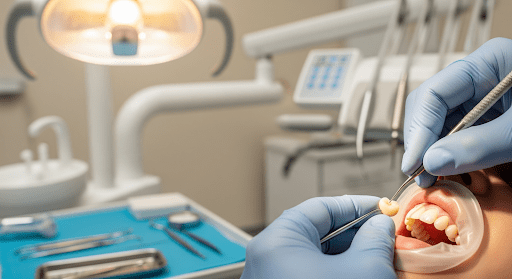When a tooth is cracked, weakened, or heavily decayed, a simple filling may not be enough to restore its strength. That’s where dental crowns come in. A crown is a custom-made “cap” that covers the entire tooth, restoring its shape, size, function, and appearance.
Crowns are one of the most versatile treatments in dentistry. They not only protect and strengthen compromised teeth but also enhance the look of your smile. Whether it’s safeguarding a weak tooth, covering a dental implant, or completing a root canal, crowns are a reliable solution for long-term oral health.
Benefits of Dental Crowns
- Strength and Protection
Crowns act as a shield for damaged or fragile teeth, preventing cracks and further decay. - Restored Function
They allow you to chew and bite comfortably again without discomfort or risk of breaking the tooth. - Natural Appearance
Modern crowns are made with materials like porcelain or ceramic that blend seamlessly with natural teeth. - Longevity
With proper care, crowns can last 10–15 years or longer, making them a durable investment in your oral health. - Confidence Boost
By restoring the natural look of a tooth, crowns give you the confidence to smile freely.
Common Reasons You May Need a Dental Crown
- Protecting a tooth weakened by decay or large fillings
- Restoring a tooth after root canal therapy
- Repairing a cracked, broken, or severely worn tooth
- Anchoring a dental bridge in place
- Covering a dental implant
- Improving the shape, size, or appearance of a tooth
Types of Dental Crowns
Porcelain Crowns
- Highly aesthetic and blend naturally with surrounding teeth.
- Ideal for front teeth.
Porcelain-Fused-to-Metal (PFM) Crowns
- Strong and durable.
- Good balance between appearance and strength.
All-Ceramic or All-Porcelain Crowns
- Metal-free and highly biocompatible.
- Great for patients with metal allergies.
Gold Crowns
- Extremely durable and resistant to wear.
- Often used for molars where strength is key.
Zirconia Crowns
- Known for exceptional strength and natural look.
- Popular choice for both front and back teeth.
What to Expect During a Dental Crown Procedure
- Consultation & Exam: Your dentist evaluates the tooth and takes X-rays.
- Tooth Preparation: The damaged portion is shaped and cleaned.
- Impression or Scan: Digital scans or molds are taken for a perfect crown fit.
- Temporary Crown: A short-term crown protects the tooth while the final crown is made.
- Final Placement: The permanent crown is cemented, restoring full function and appearance.
Caring for Your Dental Crowns
- Brush and floss daily to prevent decay at the crown edges.
- Avoid chewing hard objects like ice or pens.
- Visit your dentist regularly for check-ups and cleanings.
- Wear a nightguard if you grind your teeth to prevent damage.
Why Dental Crowns Are Worth It
Dental crowns are more than just a cosmetic fix—they restore function, protect oral health, and enhance your smile’s appearance. Whether you’re repairing a damaged tooth, covering an implant, or completing a root canal, crowns provide a strong, natural-looking solution from a prosthodontist in Houston, TX 77074 that can last for years.
If you’re dealing with a weak or damaged tooth, a dental crown could be the key to protecting your smile for the long run.


